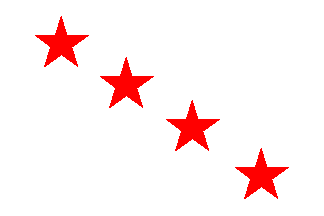
by Ivan Sache, 20 March 2000

Last modified: 2004-12-30 by dov gutterman
Keywords: italy |
Links: FOTW homepage |
search |
disclaimer and copyright |
write us |
mirrors
See also:
WW II Italian Army general officers' ranks, were as follows
(insignia worn on the field service cap):
- First Marshal of the Empire - a gold eagle clutching a fasces
(scarlet background). This rank was held only by the King.
- Marshal of Italy - four stars (scarlet frame, white background,
gold stars edged scarlet).
- General of Army - three stars; otherwise the same as above.
- General of Army Corps (commanding an Army) - a gold crown and
baton between two stars; otherwise the same as above.
- General of Army Corps - a gold crown between two stars;
otherwise the same as above.
- General of Division - two stars; otherwise the same as above.
- General of Brigade - one star; otherwise the same as above.
Source: Rosignoli's books on army rank badges.
Tom Gregg , 26 March 2000
The rank of "first marshall of the empire" wasn't
only owned by the king (Vittorio Emanuele III), but also by
Benito Mussolini. It could seem strange but they had the
same army rank. It was because this new rank was created by the
fascist parlament just after the war of Ethiopia and the
proclamation of the Italian Empire. This parlament that was all
fascist and only depending on Mussolini and gave the same rank to
him and to the king (without asking anything from the king who,
before that, was the only one to have the highest in rank in
italian army).
Guido Malberti, 4 June 2000
Here is the description of army rank flags during the Fascist
era:
Army - white flags with red emblems arranged diagonally. All
stars were five-pointed.
Army Chief of Staff: stars according to rank inside a red inner
border and a white outer border.
Marshal of Italy: four stars
General of an Army: three stars
General of a Corps: a crown between two stars
General of a Division: two stars
General of a Brigade: one star
Miles Li, 21 January 2001
Marshall of Italy during the Mussolinian era - Rectangular
white flag (2:3) with four five-pointed red stars placed along
the upper hoist-lower fly diagonal.
Now used by a General of Army.
Source: Flaggenbuch [neu92].
Ivan Sache, 20 March 2000
Chief of the general staff during the Mussolinian era - As
above but with a red border inside the flag and the number of
stars according to the rank of the officer. Seems to be still in
use.
Source: Flaggenbuch [neu92].
Ivan Sache, 20 March 2000
General of Army during the Mussolinian era - Same as Marshall,
but with only three stars.
Now used by a General of Army Corps.
Source: Flaggenbuch [neu92].
Ivan Sache, 20 March 2000
General of Corps during the Mussolinian era - Same as
Marshall, but with only two stars.
Now used by a General of Division.
Source: Flaggenbuch [neu92].
Ivan Sache, 20 March 2000
General of Brigade during the Mussolinian era- Same as
Marshall, but with only one star. Still in use.
Source: Flaggenbuch [neu92].
Ivan Sache, 20 March 2000
Commander-General , Milizia Volontaria di Sicurezza Nazionale
(Kingdom of Italy (Mussolinian era) - Rectangular (2:3) black
flag with three yellow five-pointed stars placed along the upper
hoist-lower fly diagonal.
Source: Flaggenbuch [neu92].
Ivan Sache , 20 March 2000
Chief of the general staff , Milizia Volontaria di Sicurezza
Nazionale (Kingdom of Italy (Mussolinian era) - Rectangular (2:3)
black flag including a black rectangle fimbriated in yellow and
one, two or three yellow five-pointed stars placed along the
upper hoist-lower fly diagonal. The number of stars refers to the
rank, here lieutenant-general.
Source: Flaggenbuch [neu92].
Ivan Sache , 20 March 2000
Lieutenant-general , Milizia Volontaria di Sicurezza Nazionale
(Kingdom of Italy (Mussolinian era) - Similar to
Commander-general but with only two stars.
Source: Flaggenbuch [neu92].
Ivan Sache , 20 March 2000
Consul-general , Milizia Volontaria di Sicurezza Nazionale
(Kingdom of Italy (Mussolinian era) - Similar to
Lieutenant-general, but with only one star.
Source: Flaggenbuch [neu92].
Ivan Sache , 20 March 2000